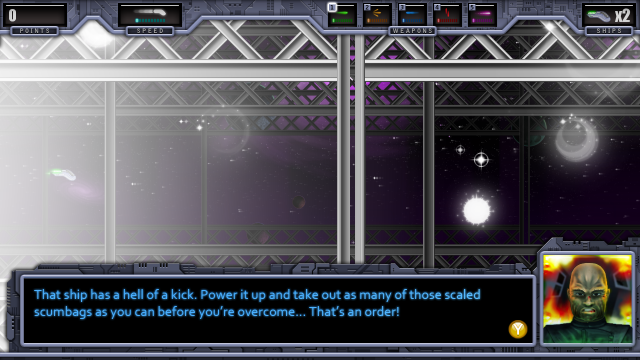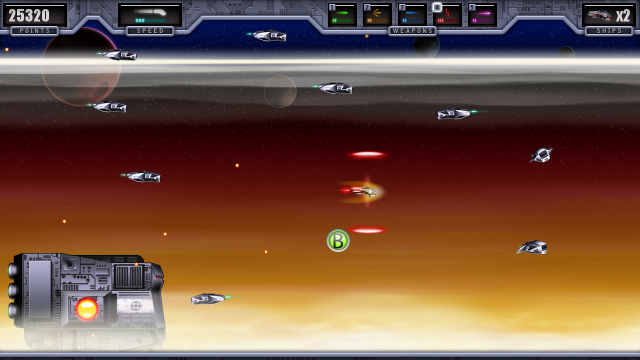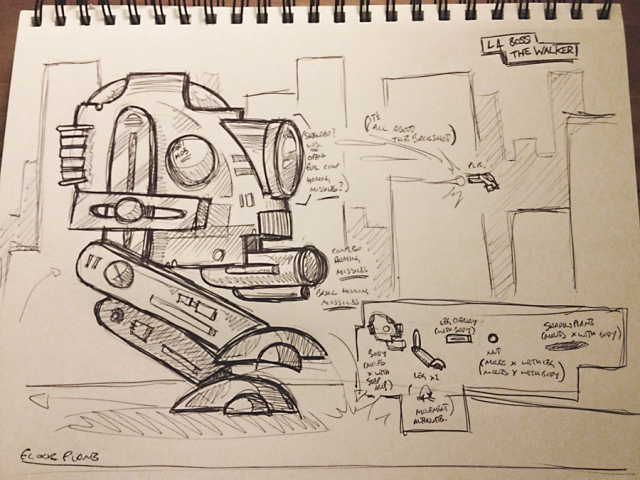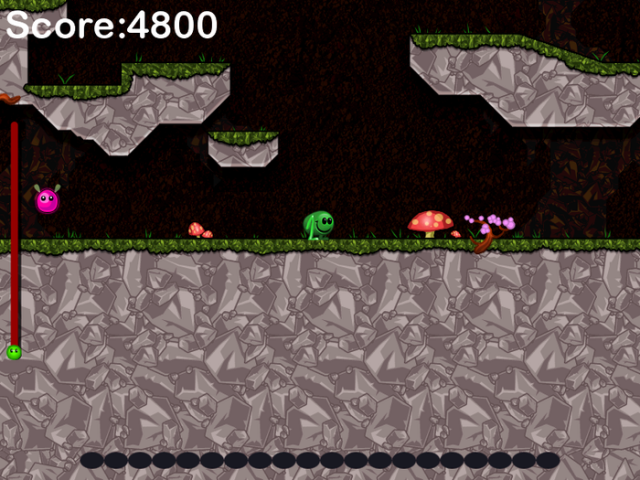
Interview with Mike Hanson of Psychotic Psoftware
I recently had the chance to chat with Mike Hanson from Psychotic Psoftware. Mike is head of the one man development company which successfully kickstarted its first indie game, Power-Up, last year. He is currently raising money to develop a new game called Flix The Flea. Mike talks about his decision to turn his coding and designing hobby into a trade, how Power-Up has grown and developed, the kickstarter process and the indie developer scene.
I understand art was your passion and your job and coding was a hobby. Can you tell me about that jump from hobby to business?
Mike: You're absolutely right. Even when I was little I was always into art in one form or another. I was pretty multi-disciplined too. I'm something of a jack-of-all-trades, master-of-none when it comes to art, so while I was never a great specialist, I'm generally competent in every shade of the art spectrum... and quite organised with my time too, which helps when it comes to my work.
I pretty much carried this attitude over to coding games in my free time. For the best part of a decade I was determined to teach myself to make a half decent game in Macromedia (now Adobe) Director... something of a beginner's tool when it comes to making games. Later on, on the advice of a friend, I moved up to XNA in the hopes of making an Xbox game. This was still at the level of a hobby of course. Some people collect comics, some people paint figurines. I make little games. It's just that thing I do when life's been stressing me out and I need an outlet.
Well, at the start of 2013 I found myself without a job and as an all rounder artist predominantly experienced in relatively unknown mobile games, I was having trouble getting one. One asset that I did have in my favour was my half-finished Xbox game, Power-Up, so I basically juggled finding a new job with finishing and publishing that...

Your first commercial game, Power-Up, was funded via Kickstarter. How did you find the process? Was it fun, encouraging, overwhelming, scary?
Mike: Oh, a bit of all of the above...
Getting creative and getting my game to new people was great fun. From compiling a good selection of really cool pictures of the game in action to figuring out (stumbling across) a video format that was entertaining, engaging and made the most of my public speaking and editing blunders in a way that added an accidental charm and quirkiness to the whole campaign.
But yes, it was a bit overwhelming too. I hadn't yet shown my face, so if it turned out that I was totally deluded and that Power-Up was in fact, a steaming pile of unplayable, I could at least take solace in the fact that that nobody really knows who I am. Doing a Kickstarter vid kind of took that anonymity away and at first, the idea that my video was going to be a public thing, meaning that I'd be held personally accountable for my work, was a bit of a worry. It took quite a while to muster up the courage to make that little film, and the editing process was fraught with nausea and nerves. As it happened, it was received pretty well and thanks to the encouragement and massive support of the online community, I found it easier and easier to do video updates on my progress, adapting and building on the techniques I was picking up.
When it comes to scary though, I think the winner goes to that feeling when you don't have anything to lose. I don't fear failure for failure's sake. I think failure is just as important as success, and I've had just as many of each during my development of Power-Up. There was one outstanding factor in this particular juncture of the process though; if the Kickstarter failed, I wouldn't be able to afford my software and Power-Up would never get released. I'd have basically been forced back to stacking shelves for the rest of my days and that would be the end of it. Compared to that prospect, making my face public and running that Kickstarter held relatively little fear - though I'd rather have a steady, honest living than fame any day.
Tell us more about Power-Up. How did the idea come about? What made you decide on that specific genre/style? Are you proud of your finished product?
Mike: Well, as I said, I've been making these little games for years now as something of a hobby. With every game, I tend to learn a few new tricks... messing with alpha levels, transitioning game-sections and music, z-priority of sprites, you name it, I've developed the skill as each game required it. Well, early on I realised that the two key things (and I mean the two really key things) to a good game are solid, fair collision detection and responsive, predictable controls. My early games lacked both and paid the price.
In making those early games, I also attempted the odd 2D space shooter. Invariably, these were entitled "Power-Up" as I wanted to remind myself that a good space shooter required power-ups. However, like with previous games, I'd fallen into a lot of bad coding habits and repeatedly failed regarding slick controls and good collision, so when I came to make my first XBLIG game in XNA, I decided that my first priority was for controls and collision. Experience had told me that the genre that would show these areas up most effectively was the 2D shooter, so I found a tutorial for a basic shooter, and built Power-Up from there.
I'm very proud of Power-Up. As a project it really stretched my skills. Through it, I proved to myself that I was able to take the game-logic concepts I'd developed with my early Director games and apply them to a new, more advanced level of coding while also levelling-up my 3D art, music and overall production and marketing skillsets too. Sure, it hasn't made me any more employable than I was before, though I'm starting to realise that with the industry in its current state, probably nothing will, so I'll make do with the rewards of improving myself and being as self sufficient as I possibly can. In the meantime, I'll keep my fingers crossed that these games will one day start to make me that honest living I've been hanging in for.

Power Up was originally only for Xbox 360 but is now also available on PC. How difficult has it been to get your game recognised in different outlets? eg Humble, Steam etc
Mike: It's funny, Power-Up was never originally intended for release on anything but XBLIG, but when I did the Kickstarter, there was such a demand for a PC version (not to mention a PC version Kickstarter award tier) that I just had to port it over. The limitations of XNA have been somewhat problematic, but overall, the PC version has been received really well and people have been really kind about it.
That said, getting noticed has been one of those problems that is pretty indicative of the issues faced by indie developers these days. You get a lot of no-response treatment from most of the big publishers, YouTubers, reviewers, etc, but once in a while you have a massively uplifting moment when someone massive asks to meet with you or offers to throw a publicity-related bone. This is where the likes of Humble have been really outstanding for me. In featuring Power-Up on their front page for just under a week, they probably put Power-Up in front of more sets of eyes than my entire two-year public production process ever managed.
Yeah, for the most part it's a bit of a grind against apathy, but once in a while something amazing like that happens and makes all the difference.
How do you find being part of the indie development scene? Is there a good support network for small studios? Do you feel part of a community? Is it scary being a small fish in a big pond?
Mike: Well I spent a good decade making little games in a back bedroom that nobody was ever going to play. Going public with that hobby was pretty horrible at first. I was like "Do I even have the right to try to make a game in public?" I know, right? Where does a feeling of non-entitlement that huge even come from?? Alright, so I was terrified, and I certainly didn't think of myself as a "studio". I couldn't even justify the whys and wherefores of this non-entitlement back when I was feeling it, let alone now when I look back on it. But I think a lot of people setting out to do something they love to quarrel with a similar demon.
I have friends, and they all have dreams. Some of them are chasing those dreams and I respect them for it. But invariably, those first steps are tentative and I suppose it's partly because in order to be able to give up the day job you've got to put yourself out there and risk people telling you that you're no good at the thing you love, and that sort of response can do sudden, unexpected, and long-term damage to our fragile egos.
Now for the most part, the community is amazingly supportive. If you put an honest effort in and set out to make something as well as you can for the love of it, you'll get a lot of love back. Don't get me wrong, I've also had a lot of people tell me I'm no good. Artists, coders and musicians have all at one point or another told me that I can't draw, code or hold a tune, but it comes down to this: the worst those people can do is to stop you doing it. If you don't stop doing it, you'll keep getting better at it.
Ultimately, I find that if you stick with the thing you love your ego will heal, and if you set out to make something good, you'll always find support from like minded people. Once I got myself into that mindset I was able to create regardless of what people thought, and I think my work was better for it.

What other doors has your game opened? I understand you have spoken at a games conference? Can you tell me more about that? Maybe more about your artwork?
I have to admit I wasn't really expecting any of that door-opening malarkey. When I lost my full-time job, the whole industry seemed to be a closed door, so I decided to do something akin to drilling a hole in the wall.
It turns out I can't not make games. Take the job away and I start doing it on auto pilot. When I hit a problem like finance, I look for a way around it... like Kickstarter. That Kickstarter campaign brought a lot of unexpected attention. Some of it welcome, some of it not so.
On the plus side, I got to attend some great gaming events for free to talk about how I ran the Kickstarter and to exhibit Power-Up too. Those events were amazing experiences for me, previously an industry grafter who very rarely gets to even attend such things, let alone be a part of them. All that said, fanfare and victory laps really weren't the reason I did it. I needed the money; without the money I couldn't make the game. It was that simple at the time.
As well as the brilliant life-affirming experiences of finding myself something of an authority on that surprisingly sought-after aspect of game development, and as well as the many wonderful fellow indie developers I met as a result of those invitations on the back of that little success, I also occasionally endured the unscrupulous.
So, I'd succeeded in my Power-Up kickstarter, but while I could now afford my software, money was still tight and I was ever more desperate for a job.
I remember a call from a company who had recently moved from prestige travel websites for the ultra-rich, into similar sites for the traveling teenaged children of said ultra-rich, and having found further success with that, the company had decided that their next logical step was into video games for those teenagers. Being versed with Kickstarter as a means of getting development funds, they called me in for a "job interview". I visited them at no little expense to find that this "interview" was basically a squeeze for free information on how to run a kickstarter campaign. When they had their fill of that information, the company promptly retracted the "job" opportunity and sent me on my way, out of pocket but that little bit wiser.
So the successes I've had as a one-man indie developer are something of a double-edged sword when it comes to outside opportunities and it's fair to say I've taken the rough with the smooth there, but these things are really separate to the point for me. Sure, Power-Up has opened up a few very enjoyable opportunities to meet like-minded game developers. I'm told that you wouldn't think it to listen to me at one of those events, but I'm actually terrified of public speaking and would sooner just make a nice quiet honest living than be the centre of attention.
As for opportunities as an artist, I'm doing a bit of part time work at the moment, but in honesty that actually came from a former colleague who knows the further extent of my work and how it can suit the needs of their games. At the time of writing, for all its accolades, its "Show Yoh Stuff" competition win last year, its honourable mentions in the awesome Retro Gamer Magazine, and upcoming EFG book, features on XBLIG, Humble and all the other great indie gaming portals, and its slow climb through Steam Greenlight, Power-Up itself is yet to bring me a job interview or a penny of actual income.
Not that I mind really. I loved making it and I'd do it all again!
Finally can you tell us what's next for Mike Hanson and Psychotic Psoftware?
Mike: Well, I'm just in the process of wrapping up the art for Power-Up on iOS. Coding for the device is a bit out of my remit so my programmer friend 2bit Games is doing the port itself, then porting that again to Android later this year.
In the meantime, I'm hoping to move on to my next major project, a platform shooter in clay called Diz. Diz is actually going to be a slick and stylish remake of the first game I ever made and I've been looking forward to getting my teeth into it for ages now.
As I say, Diz will be my next major game, and I expect it to take up my afternoons for the best part of the rest of the year, but I'm also looking into the possibility of using my free evening time a bit more effectively in the creation of ever more, smaller and possibly experimental Psychotic games in the hopes of becoming a little more prolific. The first of these games is an experimental platformer called Flix The Flea.

Flix started as an attempt to build on the design of the 8-bit classic game mechanic of holding and releasing left and right buttons in order to affect the jump height of a player character in those directions. It made for a fun but overly complicated gaming experience back in the day which was somewhat limited by the scrolling capabilities of the devices or the era, so I thought I'd have a go at modernising and simplifying the whole thing a bit. The result was Flix The Flea. I was rather happy with Flix and had so much fun bouncing around the levels I'd designed that I decided to have a go at unleashing it on the world.
When it comes to funding, the story is much the same as it was with Power-Up. I'm not charging for my time, but to release the game I'll need to pay for the licence on the software I used to make Flix. I coded it in Adobe Director, an old programming environment which was actually the first I ever learned to use, and as a result it's the one I'm most familiar with, and the one I turn to when I'm experimenting with fun little projects in my free time. Flix is pretty close to finished and the Director licence is in the region of £1000. If I get it, I reckon we'll see Flix released this Summer.
Thanks Mike for your time. It was great talking with you.
For anyone who feels inspired to support Mike and Psychotic Software the Flix the Flea Kickstarter is currently live and you can cast your much appreciated votes for Power-Up to get through Steam Greenlight here. You can also follow Psychotic Psoftware on Twitter @psypsoft for more updates.








COMMENTS